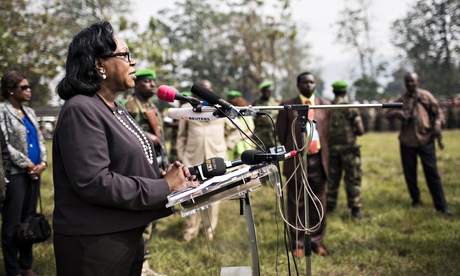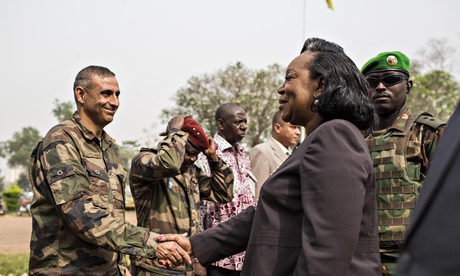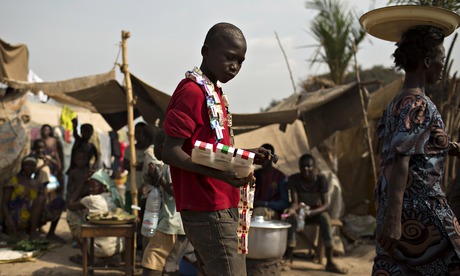
Catherine Samba-Panza addresses the CAR army minutes before the lynching. Photograph: Laurence Geai/NurPhoto/Rex
Even in a country where
public lynchings have become a regular occurrence, it proved some acts
of inhumanity still have the power to shock.
Ten minutes after Catherine Samba-Panza, the interim president of the Central African Republic (CAR),
addressed the army at a hopeful ceremony, some of its members broke
ranks to stab, stamp and pelt a man to death, drag his corpse through
the streets and set it on fire, then film it on their phones.
The killing illustrated
the fragility of Samba-Panza's authority over a nation torn by sectarian
loathing and violence. Among the deepening crises are accounts of towns
where the entire Muslim population has fled or been killed and
allegations that supposedly neutral African peacekeepers are siding with
rebel leaders.
At Wednesday's ceremony
in the capital, Bangui, hundreds of uniformed soldiers in the national
army – which had fallen apart after a coup almost a year ago – stood to
attention as Samba-Panza, who was elected last month, spoke of her "pride in seeing so many elements of the Central African Republic Forces reunited".
But soon after she left,
the mood quickly turned as the soldiers spotted a man they suspected of
belonging to the largely Muslim rebel group known as the Seleka.
An Associated Press (AP) journalist at the scene reported:
"His name was Idriss, and he was standing among them. They accused him
of being an infiltrator, there to spy for Seleka. Out came the first
knife. 'I will kill him with my own hands,' shouted one man who had come
to enlist in the national army.
"The very men expected
to protect civilians used knives, bricks and their own feet to attack
the man. Troops from the tiny African nation of Burundi surrounded the
wounded man to protect him from the growing crowd. He lay wounded on his
back and still alive for about five minutes."
 Interim president Catherine Samba-Panza greets the commander of French peacekeepers. Photograph: Laurence Geai/NurPhoto/Rex
Interim president Catherine Samba-Panza greets the commander of French peacekeepers. Photograph: Laurence Geai/NurPhoto/Rex
The AP report continued:
"But as the crowd moved closer, the peacekeepers withdrew, not even
firing warning shots. The attack resumed. Some stabbed him while others
kicked him in the face. Still others pelted him with concrete blocks as a
crowd cheered.
"A police officer jumped
out of his truck to try to halt the gruesome attack and was accosted by
the crowd and accused of being a traitor. Senior officers managed to
extract him from the mob and sped away with him in their pickup. The
crowd dragged Idriss's corpse through the street, dismembered it and set
it ablaze."
For more than half an hour, large crowds including children stood and watched the body burn, filming it on their phones, according to researchers from Human Rights Watch.
When French forces arrived at the scene, they told the crowd to
disperse, and reacted with horror when a young man walked up to them
holding the severed leg of the lynching victim and then threw it on the
fire.
Peter Bouckaert, the
emergencies director at Human Rights Watch, said: "What should have been
a moment of hope for the security of the Central African Republic
turned into a horrific scene of bloodletting and mutilation. It is
absolutely essential for President Samba-Panza to condemn this act of
barbarity and prosecute the attackers."
Bouckaert and his
colleagues said that in the past two weeks in Bangui they had witnessed
mobs carrying out two lynchings and observed three other attempts that
peacekeepers prevented.
In one case, they said,
the Human Rights Watch team placed their car between a mob and its
intended victim and took him to safety at a nearby Rwandan peacekeepers'
base.
The coup in March 2013
triggered months of turmoil and bitter hatred toward the Seleka, leaving
anyone accused of collaborating with them vulnerable to attack. The
rebels' 10-month rule was marked by human rights abuses, and sparked a
Christian armed movement known as the Anti-Balaka, which also has been
accused of atrocities.
Christians form the
majority in the CAR and in recent weeks most of the attacks in Bangui
have targeted Muslims, forcing many to flee. Other towns have emptied of
Muslims altogether.
On Wednesday Bouckaert posted on Twitter:
"At 1730 hrs on Feb 5, Bozoum's historic Muslim presence ceased 2
exist, 2,100+ remaining Muslims evacuated 2 Chad in 16 trucks 12
pickups."
 A
street vendor in a refugee camp at Bangui airport. Almost a million
people have been displaced by fighting and many towns have been emptied
of Muslims. Photograph: Siegfried Modola/Reuters
A
street vendor in a refugee camp at Bangui airport. Almost a million
people have been displaced by fighting and many towns have been emptied
of Muslims. Photograph: Siegfried Modola/Reuters
Human Rights Watch has
also said the Seleka rebels are regrouping in the north-east and accused
Chadian peacekeepers of aiding the movements of Seleka leaders. "If the
African Union is truly going to protect civilians in the Central
African Republic, it needs to rein in the rogue activities of the
Chadian peacekeeping troops," Bouckaert added.
There are now 5,000
African peacekeepers and 1,600 French troops on the ground. The UN
children's agency, Unicef, has urged the international community to do
everything it can to prevent the "human tragedy" in the CAR from turning
into "a human catastrophe". Samba-Panza has pledged to "fully secure
the greater part of the country" within a month.
Caesar Poblicks,
an analyst at the London-based consultancy Conciliation Resources, said
one of the greatest challenges facing Samba-Panza was a sense of
triumphalism among the Anti-Balaka. "They feel like they brought about
all the recent changes and the triumphalism is turning to defiance," he
said.
"They were attempting to
demand a ministry of defence position at their meeting with
Samba-Panza. They have even objected to the choice of sports minister.
Someone needs to be assertive enough to say: 'Anti-Balaka, you are not
the CAR army'."



0 comments:
Post a Comment